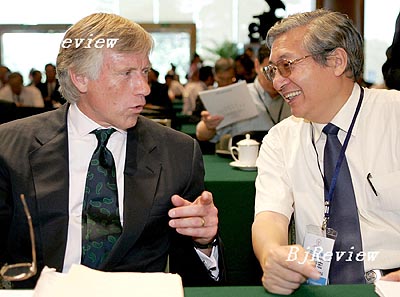
"While my specialty is using artificial intelligence to make human-like robots, my worry as a university president is that we are turning our graduates into ‘robots'," said Wang Shuguo, President of Harbin Institute of Technology (HIT), who is known for his outspokenness.
Wang is an alumnus of HIT, the institute where he attained his bachelor's degree, master's degree and doctorate in engineering. His concern is that university education has robbed students of their originality.
"The education system, especially the higher education system, badly needs reform," said Wang. He said the failure to conduct reform now could negatively influence several generations of students. "Actually the negative impact has already emerged."
In a transitional society like China, higher education is under enormous pressure to catch up with social and economic development. Wang acknowledged that this kind of pressure has transformed into higher expectations on university presidents, who are playing the multiple roles of educator, politician, PR expert and financial executive. Under such circumstances, many university presidents believe that in order not to fail in their mission they must quickly adapt to the changing society.
Fateful exam
"The shortcomings of China's higher education system have even distorted preschool education, making it exam-oriented. The key problem is that scores in the national college entrance exam are the singular recruitment standard," said Wang. Many university presidents have echoed this opinion.
Wang said in China all post kindergarten education is purely targeted at gaining a higher score in the college entrance exam, which has generated enormous amounts of schoolwork for students. "Are these growing pains quintessential?" Wang questioned.
He said the long-term heavy psychological pressure caused by all this work could lead to personality distortions reflected by extreme selfishness, lack of sympathy, complacency, no sense of regret and guilt, intolerance and lack of charity.
Wang said, "Every university should be given the right to design its recruiting standard and recruit more than once every year." He added that a failure to change recruitment procedures could affect the psychological health of millions of young people and distort the nation's development. He believes the first step of reform should be to give 20-30 percent of universities the right to design their own recruitment exams.
Wang has strong opinions about the national College English Test (CET), which is divided into CET Band Four and Band Six. This test is not obligatory, but many universities stipulate that students of all disciplines cannot graduate without a CET Band Four certificate.
"I recognize CET as a good tool to promote English studies but I am against the practice of regarding a CET certificate as the prerequisite for graduation, which is totally misleading," said Wang.
He tried to eliminate the requirement for a CET certificate in order to graduate from HIT, but gave up without success. "I had to reconsider the usefulness of CET certificates in job hunting for our graduates. Almost all employers want their recruits to have a CET certificate, so I had to push my students to pass the CET for their good, although it is against my will," Wang said.
Teaching staff management
"To fulfill the task of producing talented individuals who will contribute to society, Peking University must reform its hiring procedures in order to attract better teachers," said Xu Zhihong, President of Peking University, one of the top universities in China.
Although China began a process of reform and opening up more than 20 years ago, there has been little reform of the employment system in universities where lecturers are rarely laid off or demoted. This stagnant hiring system is markedly different from the employment system in many other sectors.
In 2003 Xu tried introducing a hiring and promotion regime at his university, under which lecturers would compete for a limited number of posts and those who failed would be demoted. The policy caused friction with staff members, who felt their posts threatened, especially associate professors and lecturers who had not produced much in the way of fruitful research. Under the new hiring regime, Peking University will headhunt from other universities.
While the reform was significant it was also prudent, undergoing 10 rounds of revision before being publicized online in order to solicit suggestions prior to a final draft being released in May 2003. It was praised as the most progressive reform since former president Cai Yuanpei's reforms 86 years before.
Xu said the reform program is in fact meant to carry on the legacy of Cai Yuanpei, whose courage to challenge the status quo Xu admired. In the early 20th century, Cai led all Chinese universities in synthesizing advanced university management
| 